Information/Write-up
Nick Ayoub was a multi-instrumentalist, composer, and educator whose impact on Canadian jazz—especially in Montreal—spanned five decades. A virtuoso of the tenor saxophone, oboe, English horn, flute, and clarinet, he seamlessly bridged jazz, classical, and studio work with a versatility matched by few of his generation.
Born in Trois-Rivières, Quebec to Lebanese parents, Ayoub moved to Montreal as a child and quickly developed an affinity for music. He began on clarinet before expanding to saxophone, flute, and the double reeds. His formal training included studies at the Conservatoire de musique du Québec, where he earned a Premier prix for saxophone under Arthur Romano. He later studied oboe with Harold Gomberg of the New York Philharmonic.
By the early 1940s, Ayoub was already performing professionally in Montreal’s burgeoning jazz scene. He played with Maynard Ferguson’s early band, the Johnny Holmes Orchestra, and trombonist Butch Watanabe. As a first-call studio musician, Ayoub contributed to countless radio, television, and theatrical productions in both English and French—a true mainstay of Montreal’s cultural life. He was also a featured oboist with the CBC Radio Orchestra.
In 1964, he assembled the Nick Ayoub Quintet for a CBC International Service broadcast, which led to a high-profile performance at the Montreal Jazz Festival and the group’s landmark album The Montreal Scene (RCA Victor, 1964). Featuring Art Roberts, Al Penfold, Michel Donato, and Cisco Normand, the record captured the sophistication and vitality of Quebec’s resurgent jazz community. Ayoub’s compositions from the album—including “Report from Cairo,” “Ya Habibi,” and “Pillsville”—reflect his global influences and modal sensibility.
Throughout the 1960s and 1970s, Ayoub remained active on CBC television and radio, even working with Latin-American dance acts like Rosita & Deno during the Bossa Nova craze. His own compositions further matured on The Music of Nick Ayoub (RCI 455, 1977), recorded with his jazz quintet and featuring a blend of woodwinds and electric instrumentation. Highlights such as “Spanish Walk” and “Jazz Concertino” revealed his growing interest in Third Stream and modern chamber-jazz forms.
A passionate mentor, Ayoub began teaching saxophone and jazz ensemble at the Conservatoire de musique de Montréal in 1970. He helped nurture a new generation of Quebecois jazz musicians, including François Théberge, Yannick Rieu, and Yves Charuest, many of whom would go on to achieve international acclaim.
Nick Ayoub passed away on May 2, 1991, in Montreal. His legacy is one of elegance, discipline, and deep musicality—a tireless contributor to the shaping of Montreal’s jazz language, and a bridge between the city’s golden age of swing and its modern jazz renaissance.
-Robert Williston
The Scene
As Montrealers—and the lucky visitors who have discovered it—know, the city’s jazz scene has rarely been more vibrant. A new era of energy began about two years ago with the founding of the Montreal Jazz Society. Since then, activity has surged: concerts, radio, TV appearances, and no fewer than five dedicated jazz venues, including Le Jazz Hot and The Black Bottom.
Not since the early 1950s, during the days of the Jazz Workshop, the Johnny Holmes Band, Oscar Peterson, Art St. Michel, and the Latin Quarter, has Montreal experienced such concentrated jazz excitement. This RCA Victor album offers a vivid snapshot of that energy—just drop the needle and hear it for yourself.
The Group
The Nick Ayoub Quintet was originally formed for a CBC International Service broadcast in 1963. Their strong musical chemistry led to a follow-up session for French CBC’s Jazz Dans La Nuit, and later to an invitation to perform at the Montreal Jazz Festival. The band quickly reassembled with minimal rehearsal, delivered a standout live set at Expo Theatre—and this recording captures that special night.
Though all members are deeply involved in radio, TV, and concert work across jazz and pop, this LP marks the group’s first official release as a unit.
THE MUSICIANS
NICK AYOUB, leader, was born in Three Rivers, Que., 30-odd years ago, of Lebanese parentage. Plays clarinet, tenor saxophone, oboe, English horn and flute. A professional since he was 17, Nick started out with Maynard Ferguson’s band. He later played with the Johnny Holmes group (Oscar Peterson on piano, remember?) and with trombonist Butch Watanabe’s band. Nick’s first love is jazz, but Montreal has drawn on him in many musical fields. He’s seen on all four local TV channels, was for a time music critic for TV-Time, and for the last two years has been on the staff at Montreal’s Conservatoire. He also plays oboe with the CBC Radio Symphony Orchestra.
ART ROBERTS, the pianist, is a native Montrealer. At 31, he has established roots in the local jazz scene while winning fame in musical comedy and vocalise. Even Adam’s Art’s first attracted attention in the 50’s at the Mutual Jazz Society jams and the Jazz Workshop. He is a follower of the Lennie Tristano school of jazz, he is a follower of Mingus and jazzmen Johnny Manone, Johnny Hodges, and Powell.
CISCO NORMAND was born in 1936 at Montreal, and is now a Montrealer. A versatile drummer who has worked extensively in theatre and with dance bands, Cisco got his start with an army band. His career at home in Montreal includes concerts with the staff orchestra of the CBC and with the Montreal Jazz Society. He is now on the Montreal jazz scene full-time.
AL PENFOLD, born in Montreal in 1940, began playing trumpet while at university. He turned professional about 1958. He has led Montreal’s most varied groups—from a six-piece dance band to a 14-piece show group—devoted a good deal of time to music instruction, and is now concentrating on jazz. His special idol is Chet Baker, but he also digs Dizzy and Clifford Brown.
MICHEL DONATO, also a Montreal-bred, is the youngest player in the present group. Originally a piano player, he took up bass four years ago and has played professionally since 1961. He’s loaded with talent for one so young. New York pianist Dick Wellstood, who worked opposite him with Buddy Hackett, was amazed at the great strides Michel had made in technique when he caught him again just five months later.
THE MUSIC
REPORT FROM CAIRO (Ayoub) – A 32-bar piece that moves from Bossa Nova to a 4/4 bridge throughout with the first and last eight bars only in the same key, C Minor.
TWO AND (Roberts) – A 12-bar minor blues, done in duet fashion between piano and trumpet. The drummer enters on the second chorus of a different pattern. The key changes in the composer’s suite in the form of blues-in-A.
BLUES FOR McHUGH (Roberts) – Opens in concert D; the lead belonged to jazz bassist Michael McHugh who later came to Montreal. It is in blues form with extended harmonies in keeping with the title. McHugh often filled local spots with the quintet.
PILLSVILLE (Ayoub) – A drum intro leads into theme (three choruses with ultra-fast tempo) with breaks in each chorus. Inspired by the Montreal General Hospital. Soloists built on a modal scale; alternates between E minor and D (as is opening theme), then wraps around with unison theme in round-off eighth-bar phrasing.
YA HABIBI (Ayoub) – A four-bar theme with a free-wheeling Arabic ambiance underlined by the quintet’s original bassist Don Habib, who now works in New York. The scale is minor and is built upon a repeated unison bass figure.
BIB AND I (Habib–Fashou) – A D Minor theme in the modal scale with regular 12-bar blues scale. Trumpet and sax alternate in solos. Based upon the chord progressions of Fats Navarro, a specific dynamic of bassist Don Habib.
MONTREAL WEST (Ayoub) – This is slower than “Montreal East,” with a 32-bar theme in which the second half is in G minor. There are two solos; the rhythm section changes key with a reversal of the opening.
MONTREAL EAST (Ayoub) – This is much faster than “Montreal West,” with a 32-bar theme; the first eight bars in G minor with the second eight alternating between E Flat and D.
LEN DOBBIN
(A keen observer of the Montreal jazz scene for the past 15 years. Radio and record columnist and correspondent for CODA jazz magazine. He’s also on the committee of the Traditional Jazz Club of Montreal.)
Nick Ayoub: tenor saxophone, oboe, English horn, clarinet, flute
Art Roberts: piano
Al Penfold: trumpet
Michel Donato: bass
Cisco Normand: drums
Produced by Wilf Gillmeister
Engineered by Roger Bélair
Recorded live at the Expo Theatre, Montreal, Quebec
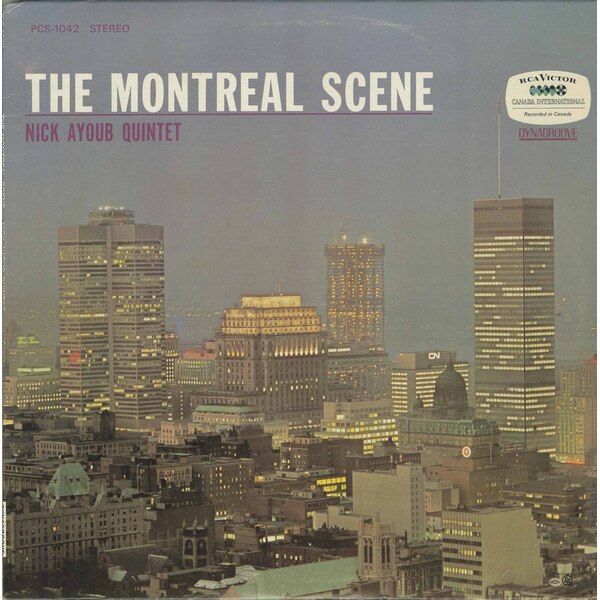
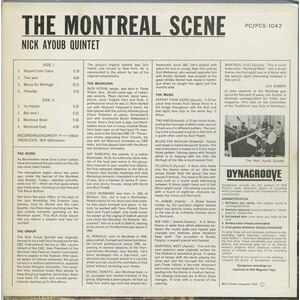
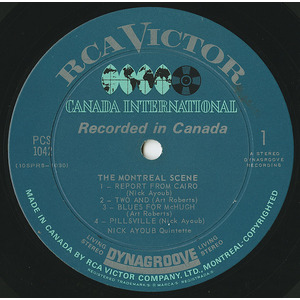
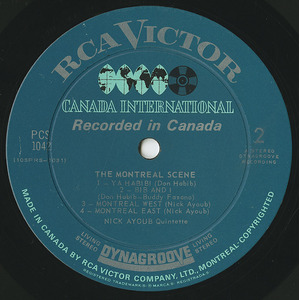
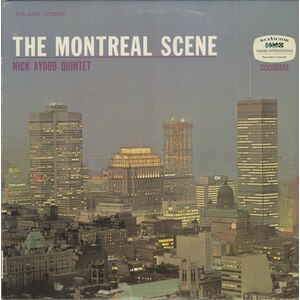
No Comments